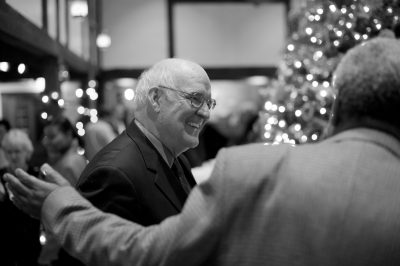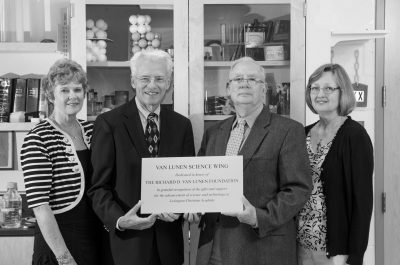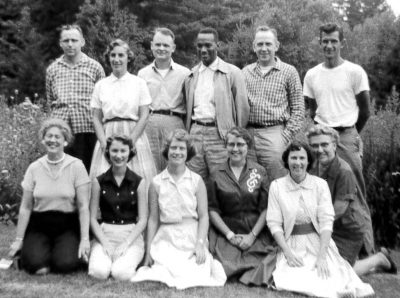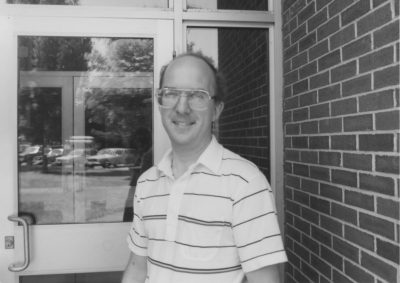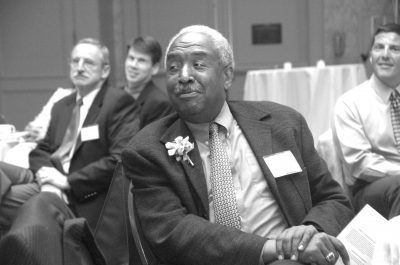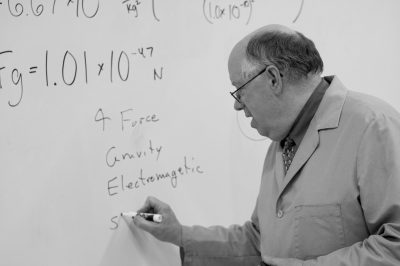Enjoy a journey through time as you explore our history…
Navigate through the years.
1940's
Elizabeth Evans Launches a Christian School
After doing some research and visiting prominent Christian Schools, she talked to Christian leaders in New England about starting a Christian school in the Boston area. She spoke with Dr. Harold John Ockenga, senior pastor at Park Street Church; with Dr. Bernard Webber, pastor at Tremont Temple; with Dr. T. Leonard Lewis, president of Gordon College; and with Dr. Harold W. Ferrin of Providence Bible Institute. She questioned pastors and laymen of many denominations. Their enthusiasm and promised support encouraged her to propose starting a junior high in Boston. A grade would be added each year until the curriculum spanned grades 7-12. On January 29, 1946, the Board of Directors of the New England Fellowship gave their formal permission for Miss Evans to proceed as she felt led by the Lord.
Miss Evans surveyed prospective parents, met with Christian educators, and prayed for God’s guidance. The survey results helped the Advisory Group, which ultimately became the Board of Directors of Boston Christian High School, to create the school that opened in 1946. God honored the work of Miss Evans and the other founders because they were intent on following his plan. God’s faithfulness to Miss Evans and the school she dreamed of is evident through each phase of growth.
First Day of School
For Betty Joy ‘50 it was a banner day that started with chapel. “I was so excited to be sitting next to other Christians!” Not everyone was as thrilled as Betty. Carol Mathisen ‘50, remembers:
Although I had no idea at the time, I sat next to my future husband, John Fitzgerald ‘50, at the opening chapel on the very first day of Boston Christian High School. He turned to me and said, “Did you want to come to this school?”
I said, “Oh, yes!”
“Well, I don’t. My father made me come, and I’m going to see to it that I get kicked out.” John was a rebel all through high school, but he didn’t get kicked out. He graduated, but he needed some help from me, especially in French.
Betty’s and Carol’s enthusiasm was the norm. Many students worked long hours to pay their own tuition, including Bruce Strickland ‘51 who delivered 128 newspapers six days a week at 3 cents per paper because he felt the need for Christian education and Christian peers.
Boston Christian High School was launched, utterly reliant on the Lord to make something lasting from this shaky beginning.
"September 12, 1946 was a banner day."
— Betty Joy ‘50
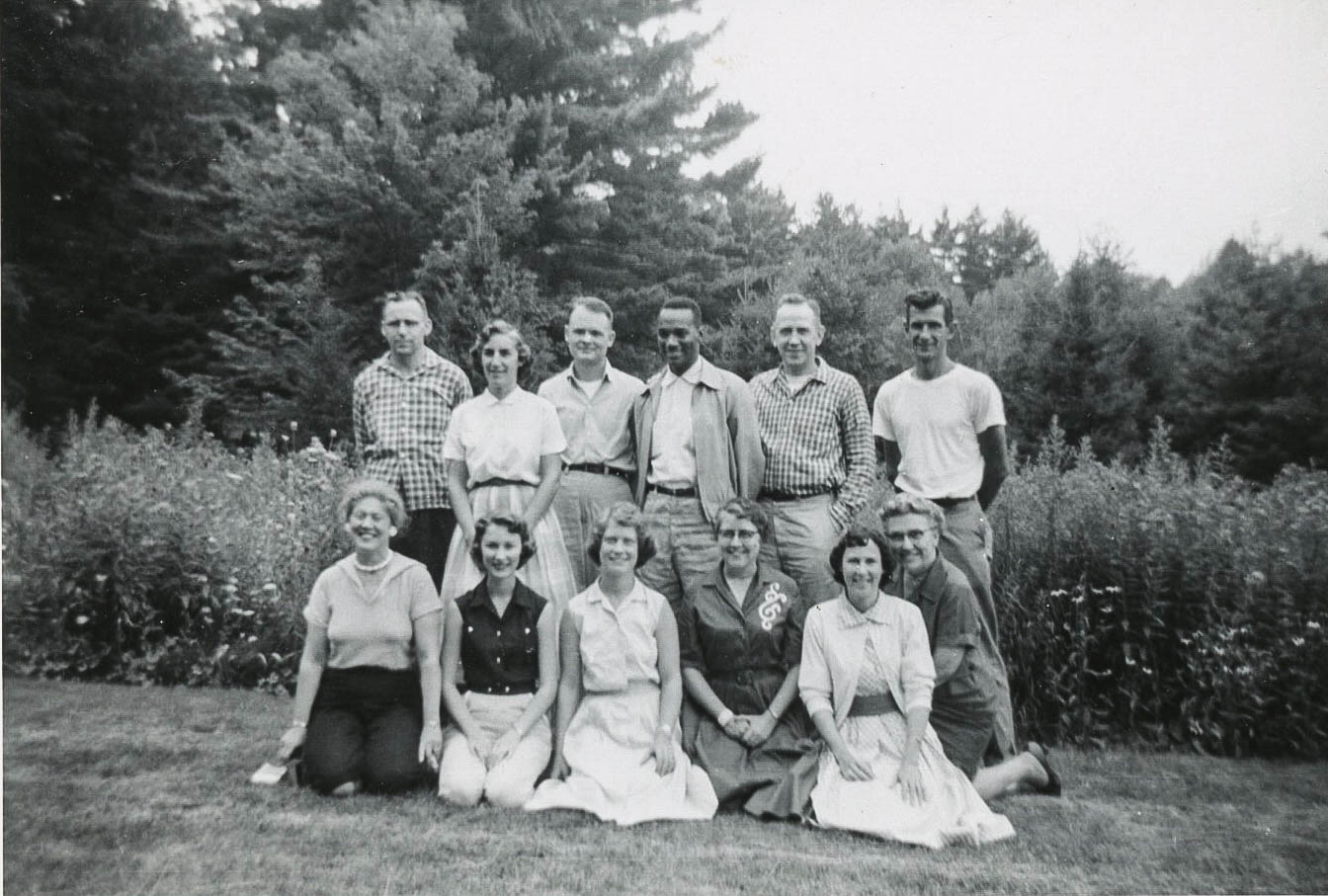
Miles Strodel (top right) with the 1959 CHS faculty
Miles Strodel: Christ Follower, Coach, Principal.
When Wheaton College senior Miles Strodel turned down the Chicago Cubs’ offer to join their farm team in favor of following God’s call to the mission field, he didn’t realize that the field God had in mind for him was in Boston, not overseas. Enrolled at Gordon Divinity School in the fall of 1947, he took a job on the side coaching basketball at the nearby YMCA. There he learned that a new Christian school needed a coach, so he did that also. A student from those years, Bruce Strickland ’51, recalls, “Miles took us from scratch and molded us into a team. No one was extremely talented, but he was a very gracious man.”
While still coaching basketball and baseball, Miles’ work at Christian High School grew into full-time Bible teaching. Conrad Johanson ’60 described his New Testament class as “a meticulous and demanding course that effectively balanced critical spiritual thinking with the coursework taught in my other classes.” And as the years went by Miles also became the Assistant Principal. Then in 1959, as the school was beginning to look for larger quarters, to seek academic accreditation, and to address its constant budget deficits, Miles became Principal.
After a long search, property on Bartlett Avenue in Lexington was selected for a new building. At Miles’ insistence, it would include a gym, a quality one. After years of making do, the students deserved their own athletic space. At the ground-breaking ceremony on June 14, 1964, Miles turned the first shovelful of earth. The ’64-’65 school year began at Arlington Heights Baptist Church; then, on November 15, students streamed into the new building at 48 Bartlett Avenue for the first time. What an exciting and gratitude-filled day that was!
Meanwhile, Miles and the Board of Trustees worked with the accreditation committee of the New England Association of Colleges and Secondary Schools to raise the school’s academic standards. Achieving this outside recognition in 1967 spoke volumes! Newly named Lexington Christian Academy was a credible academic institution with an unapologetic Christian focus.
Up until 1974, the Strodels had always taken the summer off to work at Brookwoods Camp in New Hampshire, a deep love of theirs from the beginning. The school now needed a year-round head of school. Miles resigned to take a coaching job at Gordon College that allowed the Strodel family to continue serving at Brookwoods. His interest in and concern for the school he had been so crucial in developing never waned until his death in 2009.
God Provides Grace
Arriving in Boston as a newlywed in 1948, Grace Strodel took a job as science, Bible, and girls’ physical education instructor at the new Christian school where her husband, Miles, was coaching boys’ basketball. In addition to teaching, Grace was the class advisor to Christian High’s first graduating class in 1950. In that capacity, she wrote the school song, started the senior store, which sold small items to finance the first senior trip to Brookwoods Camp in New Hampshire, and helped arrange the first graduation ceremony at Park Street Church. She advised the first yearbook staff, which named it The Lantern after the lanterns flanking the front doors of the school building, alluded to the lanterns hung “aloft in the North Church tower” in 1775, and suggested the light of the Gospel. Grace also coached the cheerleading squad and the baton twirling team. She says modestly, “We were young and foolish, and thought we could do anything!”…
The Strodels and the rest of the staff gave themselves unstintingly for the sake of the students and the Lord they served, although the school was often in financial straits. Grace recalls, “There were times we’d go into the office and the secretary would tell us, ‘We don’t have the checks yet.’ We didn’t hear how the money came in, but we always got our checks eventually. God provided, he just did.”
With a few breaks to take better-paying jobs to help Miles earn advanced degrees and to care for their young children, Grace worked at the school until 1980. While teaching girls’ P.E., she took courses in library science so she could be the librarian. She started the girls’ field hockey team and the tennis team. For several years she scheduled all the athletic games. Through all this, her love for young people and her winsome ways with the girls she coached and students she taught shone through. Colleague Janette Arruda said, “Grace Strodel impressed me so much! She was a true woman of God, deeply loved by her students. I wanted to be like her.”
Students were always welcome at the Strodels’ home from the time they lived in a two-room apartment in Dorchester to their years across the athletic fields from the Bartlett Avenue building in Lexington. Grace still lives near Lexington Christian Academy, and she continues to pray every single day that the Lord will guide and bless the school, and that his influence will ripple out to all the places where its graduates go.
The Move to Garden Street
1949 was a year of significant firsts. Enrollment grew and Boston Christian High School needed to expand beyond the facility on Huntington Avenue. On June 21, 1949, the Board of Trustees voted to purchase the former Browne and Nichols School at 20 Garden Street across the street from Cambridge Common, where gym classes could be held outdoors in good weather. It was close to Harvard University and close to public transportation, which was crucial to enable students in outlying areas to attend. Board members had to sign the legal documents personally as the school had not established credit. Isaac Thiessen of Pine Ridge, Kentucky, accepted the position of principal for the 1949-1950 school year. On October 3, 1949, the school’s name was officially changed to Christian High School. God’s faithfulness can be seen through the people he brought to meet the needs of the young school.
The new building brought challenges…
There was work to be done and financial resources were limited. Students and parents helped to clean the building. Members of the board cut the lawn and took care of the grounds. When there was painting to do everyone grabbed a brush. These projects developed a powerful and enduring sense of community.
The basement chemistry and physics lab provided unwelcome excitement in the fall of 1955. Here, over 50 years later, is David Leveille’s recollection of events:
I remember the incident occurred in the fall of 1955, probably in October or early November. I was in the room directly above the laboratory when the explosion hit. It was English class, taught by Lorraine Stigbert. When the explosion occurred, most of us in the room felt our chairs lift 2-3 inches off the floor! I’m not exaggerating! Almost immediately fumes seeped upward and the smell was exceedingly pungent. People screamed.
I may be wrong, but I don’t remember the school being closed, for I think it was a Friday afternoon that the event occurred. On Monday school went on as usual despite the smoke damage, although the lower level was off limits. People must have worked very hard over the weekend to make the place functional. The exact cause of the explosion was never officially established.
Despite challenges, both expected and surprising, Christian High School thrived. Students’ enduring memories from the Garden Street campus are a reminder of God’s faithfulness. This young school quickly became a community where hundreds of students would learn both subject matter and how to live as Christians in the world.

1960's
First Athletic Championships
A consistent connection among the Christian High community was athletics. Miles Strodel was the basketball and baseball coach throughout the Garden Street years and beyond, while serving as assistant principal and later, principal.
Players treasured Miles’ teaching. Captain Marv Wilson ’53 said, “Miles taught us discipline, teamwork, and leadership.” David Barram ’61 recalled, “He showed us how to set high standards and live up to them”.
At the Garden Street campus, basketball practices and “home” games were held in Browne & Nichols’ gym. For practices Miles and older players drove personal cars to B&N after their players finished at 5 p.m. Similarly for games, with assistant coaches, parents, and students driving everyone else. Dick Schuhmacher with a fabled “built-in GPS”, always drove the cheerleaders in his clunky ‘48 Studebaker.
The school was small, so also the pool of eligible players. In 1961 there were only 35 eligible boys in the entire school, yet that year they won the state championship in basketball! Alumni remember nearly the entire school, including parents and teachers, watching Miles and the team pray together beforehand, then the enthusiastic fan support throughout.
David “The Shot” Barram ’61, a member of the 1961 championship team, contributed 33 points to their final overtime win. Starr (Watson) Werenko ’61 says her dearest memory of CHS is “the look on Coach Strodel’s face when CHS was presented the trophy.” Barram wrote a beautiful tribute when Miles was inducted into LCA’s Athletic Hall of Fame in 2005: “I marvel at how much detail I remember about what Miles taught me. He didn’t tell us that Jesus taught us to have integrity – he lived his life with integrity. Players will remember his, ‘Don’t leave any regrets on the floor.’ ”
Joe Fitzgerald ’62 noted, “In classic CHS fashion, the guy who sealed the Massachusetts Class D championship for the second year in a row was not Ken Guild ’62, the high-scoring captain, nor Glen Schuhmacher ’62, the center who retrieved an amazing number of rebounds. It was Frank Raymond ’62, a polite, unassuming and utterly reliable guard who had the game of his life that night.” A tiny school with no gym of its own won again, and the loyal CHS fans went wild!
Both championships were featured in the Boston papers, classic stories of the underdog triumphing. The championship banners of 1961 and 1962 hang proudly in LCA’s gym.
Move to Lexington
Slowly, slowly, enough money came in to begin. A groundbreaking ceremony was held on June 14, 1964. Dick Schuhmacher ‘60 attended the ceremony with his then-fiancée, Jill. “It was a big mess because some of the excavation had started. There were heaps of earth and some excavating equipment sitting around. It made for a bleak sight, but it was exciting to see that work had actually begun on this building.” By March 1965 the relocation fund reached $235,400, about one-third of the needed amount. The remaining cost, after deducting the proceeds from the building in Cambridge, was covered by a mortgage.
Three items from 20 Garden Street were saved and are still on display in Lexington: a wooden two-person desk in the atrium, the black and gold Christian High School sign, and a lantern from the front entrance, so deeply linked to the school’s identity.
Because construction wasn’t quite complete, classes for the 1965-1966 school year began at Arlington Heights Baptist Church. At long last, on Monday, November 15, students streamed into 48 Bartlett Avenue for the first time. Although appealing as all fresh, new buildings are, the place was spare: “a big square red brick block,” as one 60s-era student described it. It had no basement due in part to the high water table, which would cause problems down the road. The interior walls were painted cement blocks; cement floors were covered in linoleum tiles. The first floor held four classrooms, a row of offices, the multi-purpose room, and the gym and locker rooms at the back. Nine classrooms and the library took up the second floor. To Buck Lombard ‘69, “It seemed like the rooms were big enough for fifty desks! Every room had nice new furniture. The labs were good, and they were safe. But as far as I was concerned, the best thing was the gym, and not just any gym — one with a springboard floor, the best! It was so good the Boston Celtics practiced there in the summers.”
As in 1946 and 1949, the school community was launched on a daunting adventure in a new place, reliant on God’s grace, the generosity of many, and the earnest prayers of Boston area believers.

Meadow Breeze Day Camp
Because other private schools in the area sponsored day camps during the summer to bolster their bottom lines, Christian High School decided to do the same once it had moved to Lexington. The camp would provide summer employment for older students, alumni, and some faculty while offering a service to the wider community – and might even attract future students. A seeming extravagance at the time, a pool was part of the campus plan right from the beginning.
Meadow Breeze Day Camp opened in the summer of 1966, and has operated every summer since then, except during the pandemic-impacted summer of 2020. It offers indoor and outdoor activities, plus initially a daily Bible lesson. Many faculty members have supplemented their teaching salaries, and many alumni have earned college tuition working there. One who did, Lynne Borden ’69, found her career.
“In the summers I worked with the four- and five-year-olds at Meadow Breeze, and this changed my life! One boy wouldn’t respond when we called him back to the group. Even though he wandered around the room during Bible stories, he knew the stories perfectly well. Getting to know Freddy led me to choose special education as my life’s work.”
In the early years, the camp only added a few thousand dollars to the school’s budget, but under careful management, good publicity, and smart personnel decisions, it came to provide significant revenue for the Academy. After camp ended each day, a pool club was available for many years to the school’s neighbors, further boosting the budget. That 1965 extravagance was a prudent investment.

Accreditation
While accreditation for Christian High School was explored early in the history of the school, the first accreditation came in 1967. The financial instability of the school in the early years was a factor that kept CHS from full accreditation. Meanwhile at the behest of The New England Association of Colleges and Secondary Schools (now NEASC) and following their deep desire to honor their Lord, the Board, administration, and faculty kept working on improving the academics. The school was continually evaluated for how well it did what it claimed to do, providing excellent academics with a Christian worldview. This was a relentless focus – preparing students to work or study anywhere, while also nurturing their growth as children of God.
Miles Strodel was passionate about outdoor education, athletics, college-preparatory curriculum and preparing students for Christian service. He focused on developing the college preparatory curriculum and facilities. The visiting committee of NEACSS noted the need for facilities in its report. They also noted the need to separate the college-preparatory and general curriculum more clearly. More electives of an “easier scholastic nature were needed for the general ed students” (Board Minutes).
Throughout Mr. Strodel’s tenure, he worked to stabilize the school. The curriculum was strengthened and full accreditation was granted in 1967. The new facilities in Lexington addressed some of the needs noted in the NEACSS report. Miles credits “the parents who stood behind us and wanted the best. They would not settle for less.”
LCA has continued with full NEASC accreditation on the ten-year renewal cycle. In 2016 Lexington Christian Academy was named an Exemplary School by the Association of Christian Schools International. There are 19 Exemplary Schools recognized by ACSI nationwide. ACSI accreditation was granted at that time.

70's & 80's
Festival of the Arts/ArtsFest
Celebrating creativity in the arts at Christian High played a significant role in the memories of the earliest Alumni. Service and performance were often combined, with impact on lives occurring through both.
Amy Young Burns began as choral director in 1949, setting high expectations for her students. The first choral concert was held at Cornerstone Baptist Church in May 1950, and subsequent concerts in downtown Boston drew overflow crowds. Annual Spring and Christmas concerts, including the Hallelujah Chorus, became treasured traditions. Jim Bolton ’72 recalled the excitement of singing at these events and later with his children at LCA. The Chorale tour, significant to many, started in 1967.
CHS students performed a spring play, and the Bartlett Avenue building’s multi-purpose room initially supported a robust theater program. However, by the 90s, performances outgrew the space.
The Visual Arts program also faced space constraints but still produced significant work. English teacher Mary Vanden Berg Speyer, who taught from 1972-1978, and colleague Lynn VanderZalm started the Festival of the Arts (later ArtsFest), which celebrated student creativity through literature, music, and visual arts. They published exemplary prose and poetry in Spectrum, renamed Cadence in the 1990s.
Chip VanderBrug, who joined the art faculty in 1988, transformed the department, creating sets for plays, ArtsFest, and Spiritual Emphasis Week with the help of many volunteers. Starting in the MPR and later using the Gym, his work grew with the program.
Students have earned recognition in state and area contests in music, theater, and art. The May 2013 opening of The Cross Center for Worship and Performing Arts, along with the Art Gallery, highlighted the importance of the arts at LCA.
The Art Hill Years
Mr. Hill met the criteria the Board had set: he was a career educator who understood and believed in Christian education, and was a polished public speaker. He excelled at fundraising (key to the Board’s goal of eliminating the mortgage) and he presented a professional image to the wider community.
The Christian emphasis of the school remained important. Mr. Hill often spoke at churches and met with local pastors to keep them aware of LCA as a worthwhile option for their own children and the children in their congregations. Hill emphasized that the role of the Board was policy and keeping the vision. This was an important transition from the past. His report of August, 1975 notes, “A basic priority is ascertaining in as much detail as possible what we should be about [emphasis added]. Every discussion with independent school people indicates that the school which will exist and flourish in the future will be that school which has come to grips with its basic identity, purpose, and at the same time has integrated successfully its basic philosophy into curricular and program form.” His reports to the Board were detailed and explicit so they could trust that things were running smoothly, freeing them to focus on the big picture. His annual reports laid out progress being made and suggested a focus for the coming year.
Art Hill’s wife, Peg, was his faithful supporter, and was consistently involved in the life of the school and care of the faculty. It was not all unusual to see Peg working in the lunchroom.
Under Hill’s leadership, the academic program continued to be strengthened. He was able to hire a group of dedicated teachers as the school grew. Hill was intent on supporting the professional development of his faculty. The college preparatory curriculum was strengthened, a program for students with learning needs was added and College Advising was taken to a new level. Hill believed that God would be faithful in providing the funding and the staffing needed to make LCA an excellent Christian school.
The Mortgage Burning - faithfulness rewarded.
Christian High School’s humble beginnings resulted from the faithful vision of a few, supported by parents, faculty, and board, willing to do what was necessary to accomplish the goal of a Christian School for Boston.
Historically, faced with the delicate balance between fiscal responsibility and quality education, board focus remained on the vision, the mission, and on God as provider. Periodically, board members gave of their own money to make up a paycheck shortfall.
When challenged with raising money for a new campus, board minutes read, “The immensity of the task before us was staggering – overwhelming were it not for the faith God has given us in his power to do the impossible. Psalm 27:13-14”
Relocation to Lexington resulted in a mortgage. Acquiring accreditation in the 70s intensified the challenge of paying down LCA’s debt and attracting Christian families. The board discussed closing the school in 1970 but concluded that God wanted it to continue. A five-year plan was presented that included a prayer calendar imploring the Lord to supply their needs.
Arthur Hill became headmaster in 1974. He excelled at fundraising – key to the board’s goal of eliminating the mortgage. This promised a new level of financial stability for LCA.
The board set the astonishing goal of retiring the burdensome mortgage entirely by the end of the decade. Two trustees were notable in this effort. Steve Tavilla and Phil Johnson, who served on the board for 20 and 25 years. A former headmaster said of Phil, “If Phil had not been connected with this school, the school would not exist as it is today.” He said of Tavilla, “Steve developed a heart for LCA so genuine it makes all the verbiage people spew about Christian education cheap by comparison.”
The board’s astonishing faith and determination, the generosity of many, and the prayers of the school community culminated in burning the mortgage at a ceremony on October 20, 1979, with Charles Hilgenhurst serving as Chairman of the Board. This joyful celebration included the participation of two founders – Elizabeth Evans and Harold Ockenga. A program message from the trustees reads:
“We of the Lexington Christian Academy community firmly believe that the presence of our school is a miracle, and that our celebration of the mortgage liquidation represents a present-day supernatural intervention of God. We invite you, therefore, to join with us in offering joyful and humble thanksgiving, because This is the Lord’s doing; it is marvelous to see. –Psalm 118:23.”
“The immensity of the task before us was staggering – overwhelming were it not for the faith God has given us in his power to do the impossible."
— Psalm 27:13-14
Curriculum Philosophy
A parent objected to the book 1984 by George Orwell. He gained support from board members and other parents, causing a great deal of stress. He wanted the school to change course for a more conservative position. This would change the college preparatory mission of the school. This issue boiled down to how to be both a college prep school and a Christian school. In his report to the Board on September 29, 1988, David Roth wrote, “The biggest hurdle we face at LCA is… an understanding and support for the philosophic and spiritual basis for Christian school education.” The literature in question was accepted in the literary canon and expected background for college. It was important for parents to understand that it is not the school’s role to shelter students from “the world,” but to teach them how to approach reality from the perspective of a Christian worldview. This is a key tenet of curriculum development.
The English department drafted a policy statement laying out criteria for choosing literature. Roth and Gordon VanderBrug, Chairman of the Board, staunchly supported and encouraged them. With Gordon’s firm leadership the Board approved this motion in 1989: “The Board of Trustees affirms the work and integrity of the English Department, the Faculty, and the Administration in the following areas: philosophy, process, and curriculum.”
This was a significant turning point emphasizing the need for a well-trained faculty who were experts in their field and strong Christians who could apply worldview principles to the curriculum. This set the stage for the work done by Koops, Kim Winsor (Academic Director) and VanderBrug in moving the school forward with Vision 2000. The goal of a college preparatory Christian school is to prepare students to be credible scholars who can winsomely discuss content through the lens of a Christian worldview. This is true in all content areas. The double focus is critical to a curriculum that is based in a Christian worldview and is also college preparatory.
Challenges to a college preparatory curriculum taught from a Christian worldview were addressed directly.

1990's
Adding Sixth Grade
“Nurturing young teens and guiding them in the way of Truth.”
She and the other teachers carefully designed the curriculum and the atmosphere they wanted for sixth graders, but also for seventh and eighth graders — to create a true, healthy middle school. For most incoming students, this was the first time that they had different teachers for different courses, that science class included regular labs in a real laboratory, and that high school-age kids attended the same school. To cultivate connections between the “big kids” and the “little kids,” Mrs. V’Soske set up a buddy system, carefully matching high school volunteers with sixth graders. They promised to spend an hour a week helping with homework, attending a game, or just hanging out.
To cultivate connections between the three middle school grades, a three-day retreat at Brookwoods Camp in New Hampshire was held every October. Students and teachers climbed mountains, swam in chilly Lake Winnipesaukee, competed in team challenges, ate at mixed-grade tables, listened to guest speakers, and held small group devotions. A day in winter was set aside for ice skating or snow activities if weather allowed, indoor games if not. At the end of the year, the middle school went to Canobie Lake Park after Middle School Awards Night.
Two memorable sixth grade activities were Creativity Festivity, a day when students shared hobbies, talents, and favorite foods, and Trip Across America in which each student devised an imaginary trip to places in the U.S. that they wanted to visit. They had to calculate mileage and budget to fit within two weeks. In the fall of 1995, one of the students mentioned a new tool that might be useful: the Internet. Mrs. V’Soske was receptive, and a new era of research in school was launched.
Although the curriculum has adjusted to changing needs and changing times, one constant remains: a team of teachers intent on nurturing young teens and guiding them in the way of Truth.
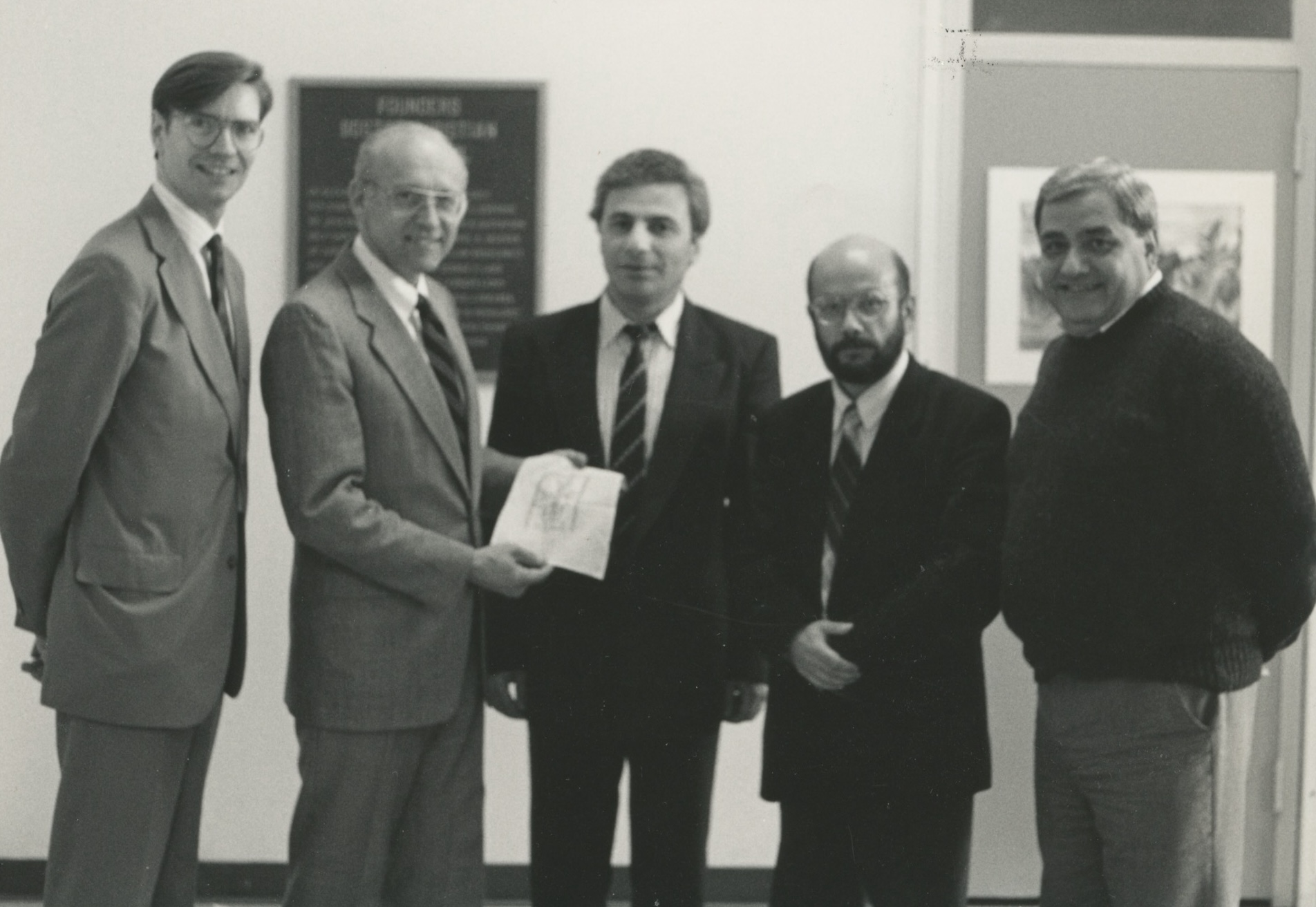
A Meaningful International Connection
From its founding in 1946, and throughout the following decades, the mission of CHS/LCA has been to be a school committed to the integration of excellence in education with an unapologetic commitment to the historic Christian faith. Major policy decisions as well as daily practices may be intentionally and regularly measured against this stated mission. The way this plays out in the life of the school is, indeed, the story of the school. This was revealed in a remarkable way in line with an important historical world event, when LCA’s mission was inspiration for the foundation of a new educational system in the newly free country of Armenia, following the fall of the rule of communism in that country.
In April of 1991 Professor Robert Gabrielyan, the chief of the Education Commission for the Yerevan City Council and Yuri Gylavian, principal of Armenia’s only secondary school in the capital city of Yerevan, High School No. 1, traveled to Massachusetts as guests of the Cambridge-Yerevan Sister City Association. Their goal was to find a model for their high school that in itself would be a model for all the new nation’s schools. Armenian officials wanted to create a new educational system for their new democracy, and they wanted to stress the Christian moral ethic in a way that had not been seen in Armenia for nearly three generations.
Roupen Kiredjian, father to an LCA alumnus, included a short stop at LCA in the schedule of visits to educational institutions, wanting to introduce the visitors to his son’s alma mater. They were impressed with both the spiritual atmosphere of the school as well as attention to the learning needs of students as individuals and thus began the first step on a road which led to the formation of a partnership between LCA and Yerevan’s first free high school. The government decided it needed a model for its 250 restructured schools, and the model it finally chose was Lexington Christian Academy.
Looking to the future, Gylavian said, “We hope that our school will become a very advanced school and that it will eventually change the level of education in the entire country.”
Full details of the story were reported in the Boston Sunday Globe, written by reporter David Buse and can be read in its entirety: Armenian Sister School publicity – Boston Globe.docx
Vision 2000
The academic leadership team included Koops, Ray Martin and Kim Winsor. To continue to improve the curriculum, faculty professional growth was required with an expectation that faculty would earn an advanced degree. To support this initiative the Academy budgeted money to support graduate work for faculty. As a result additional AP courses were added. The curriculum moved to a College Prep model with the lowest level of courses being College Prep, then Honors and AP. This allowed for the addition of more advanced courses. The Headmaster’s Scholarship was created as a way to attract students who were looking for a College Prep School.
The focus changed to “Best Practices” and a significant amount of work was done to support faculty as they created a more demanding curriculum. Not only did the academic content areas change but so did theater, visual art, music, and athletics. This resulted in the need for enhanced facilities which resulted in significant fundraising and planning. Additional enhancements were added to the curriculum including Interim, trips both domestic and international, and additional electives.
It was exciting to see how Vision 2000 helped LCA to grow into a college prep school that is highly regarded. This led to the designation of LCA as an Exemplary School by the Association of Christian Schools International. When VanderBrug stepped down as board chair Barry Koops summed up his contribution to the school: “You have not flinched when faced with fearful financial problems. You care intensely that LCA is consistently and pervasively Christian. You always care that the Christian dye colors every thread. You care intensely that we continue to improve and strive for excellence that will be a suitable gift of love to our creator.”
Wally Wadman took over as Board Chair. Wally had a long history with the school as both a parent and board member. God’s faithfulness was again evident in the leadership of Lexington Christian Academy.

Campus Updates: Growing pains as LCA builds a 21st-century campus
The first visible change was the much needed upgrade and expansion of the athletic fields in 1996. The first addition to the building was the activity center and courtyard on the south side. In the fall of 1996, two portable classrooms were set down between the MPR and the gym. Later they, plus two more, occupied the front lawn after the MPR and admissions wing was torn down to make way for the new library, classrooms, atrium, and cafeteria. Still the place was bulging at the seams. Headmaster Koops had to vacate his office for an hour every day so the calculus class could meet there. Some study halls were conducted in the gym balcony. Hallways were crammed. Students acted out scenes from Shakespeare to the tramp of construction workers’ boots above them. Chorale and instrumental groups practiced while athletes used conditioning equipment at the opposite end of the “cave” next to the gym.
When the large addition at the north side of the building was completed in time for school to open in 2002, it felt like everyone could breathe deeply again. The space was beautiful and airy. The lantern shape of the library rotunda and the lantern shaped fixtures hanging from the atrium ceiling emphasized the school’s historic intention to be a beacon of light and truth.
When the school learned that the town might increase the setback from wetlands, the shell for the auditorium was added to the new entrance and administrative offices next to the art and music wing. The chapel and performance space was completed in 2013. Meanwhile, the science labs were reconfigured and vastly improved. The expanded gym was dedicated in 2006. Once the lavatories and fitness room were remodeled, and the student lounge repurposed as the Maker Space, the building reached the shape it was at the time of the 75th anniversary. It is a building well suited to enabling outstanding Christian education.
Cultivating Inquiry and Student Veritas


2000's
The Cross Worship and Performing Arts Center
Increasingly ambitious performances and greater enrollment rendered the space inadequate in the 90s. In years following, many events were produced in the gym, with amazing sets constructed and broken down by Chip VanderBrug and dedicated volunteers.
Aware of potential changes in the zoning for wetlands boundaries, the shell of an auditorium was put up in 2005. Once up, the school was compliant with existing ordinances, and work could proceed as funds came in. After a multi-year lag a generous grant from the Cross Foundation finally enabled completion. Many people who no longer had students in the school donated to make the Cross Center a reality. That’s a beautiful thing about LCA – people give back and pay it forward. At the dedication ceremony in 2013, Trustee Rob Lawrence summed up the entire process neatly: “We needed $6 million, we prayed for $6 million, the Lord provided $6 million. Thanks be to God!”
At the first day assembly in 2016, Christine Metzger told the students, “Before the top layer of flooring was laid on this stage, I invited everyone in the building to write their names or a scripture verse on the plywood subfloor. When you perform here, you are standing or sitting or dancing on the names and prayers of those who were here in 2013. This space has been blessed by and prayed for by many people. Never forget that!”
A large cross on the wall is a reminder of our principal allegiance, and the front of the stage bears the quote from Dutch theologian Abraham Kuyper: “There is not a square inch of the entire creation over which Christ does not cry out, This is mine!”
Lexington Christian Academy North Campus - LCA’s Global outreach
While the school did its best to care for them, it took more years to realize how much and what sort of support these kids, half a world away from home and familiar culture, needed to thrive. Their lives outside of school were managed by educational consultants their families had hired, often presenting challenges over guardianship and satisfactory living arrangements. That a good number of those early international students became valued members of the student body and graduated is a credit to their courage, intelligence, and grit.
In 2011 the school began requiring new international students to board at what came to be called Lexington Christian Academy North Campus. This residential facility was owned and run as a dorm and intensive test preparation site by a Christian Korean couple willing to rent space to LCA. Kate Young Caley first directed LCA’s program, assisted with house parent duties by Ryan Patrie.
With the owners’ decision to return to Korea and their offer to sell to LCA, the Board was faced with having to decide between three choices – to end the international program, buy a property larger than might be needed, or build a new facility.
An ad hoc committee of Board members and parents worked diligently on considering all options before reporting back to the whole Board. Much discussion and earnest prayer led to a unanimous decision to buy the property, confident that this was where God was leading.
In 2018 Cindy Torjesen was named Director of Residential Life and Director of International Admission. She, along with Kim Winsor, Director of North Campus Operations, and David Allen as Facilities Director, devoted much time and thought into making the dorm a healthy and comfortable community for students living far from home. Meaningful new traditions have evolved there, to which day students may be welcomed, with the International students adding richly to the life of the Academy.
The current boarding population includes students from a variety of countries as well as global students – American by nationality but living much of their childhood overseas, as well as seasonal ones – students who stay during basketball season. LCA’s naturally increasing ethnic diversity has been wonderfully complemented by this move.
Coping with Covid
At the beginning of 2020, a new virus called Covid-19 barreled through the country and the world. The first two deaths in the U.S. came on February 29, and it spread so rapidly and so little was known about it that nearly every business and school in the U.S. had to close. Amy Chaney recalls how LCA coped: “We had to re-imagine an entire school from scratch in ten days. We canceled AIA (Academics In Action) to give [the administrators] and the teachers a bit of time to learn entirely new ways of doing things. I thought, ‘I can’t fool anyone into thinking that I can do this! Lord, you have to take the wheel.’”
Middle school science teacher Kathy Oliver describes her experience teaching via Zoom from her home:
Introductory Physical Science is a very student-investigative course. That’s the best thing about it. I had to settle for doing their labs for them. . . . I have improved my tech skills a lot, but it’s not as rewarding because I’m a very relational teacher. It’s not the kids’ fault, but they don’t participate. At school the kids are nearly jumping out of their seats to say something. [Now] I have to pull all kinds of strings just to get them to engage. . . We don’t really know what’s going on in students’ homes. Some folks are having a rough time. Perhaps they don’t have a reliable internet connection; perhaps a parent works in a hospital. It’s a trying time, to be sure.
The international students’ situation was more fraught: national borders were closed; airlines were shut down; would they ever see their families in person again? In contrast to many other schools and colleges, the dorm remained open, even past the end of the school year, until every student was able to return home. Cindy Torjesen and Kim Winsor worked every day at the dorm to care for those anxious students. During the ’20-’21 school year, Head of School Christine Metzger made sure that those students were cared for: “We didn’t close during the holidays, or we arranged places to stay for those who couldn’t go home.”
Although the ’20-’21 school year was in person, enormous effort went into making attendance as safe as possible. Everyone had to wear a mask all day unless eating or drinking. Students were assigned to cohorts of 10-12 which stayed in the same space all day, with staggered times to go outdoors for some exercise. Teachers came to them.
Despite all the precautions, people got sick. Jadyn Williams ‘26 explains the results. “We had school in person unless someone in our cohort caught covid, and then we’d all have to stay home and have classes on Zoom for a week. It was frustrating because either you or the teacher would have a computer glitch, and you didn’t know how to fix it. It was so unpredictable!”
Massachusetts’ mask mandate was finally lifted in March, 2022. Metzger remarks, “I know of several school leaders who were drained by trying to navigate disagreements about masks and vaccines. The overriding attitude [here] was ‘We’ll do what the community needs to make learning happen.’ People were cooperative and thoughtful of others. We were so blessed!”

Celebrating 75 Years
LCA hosted a celebration to highlight faithfulness and growth by inviting alumni, parents, and teachers from across the decades to share their memories from their school days and stories of the impact made by teachers and friends.
Nearly 350 guests from across the globe (including California and South Africa) returned to Lexington to celebrate the school’s anniversary. The program included a lunch that honored 10 faculty, staff and board members who have served LCA for over 30 years, and a ceremony held in the 437-seat Cross Worship & Performing Arts Center. The day’s festivities included speakers from across the school’s history and musical performances from current students and faculty. To cap off the day, a reception took place in the Miles Strodel Gymnasium with a photo booth, yearbooks from each class, and the school’s lion mascot, Leroy the Lion!
Among the featured guest speakers to return to her alma mater, was Barbara Babcock Ferguson, the very first graduate to walk across the stage and receive a CHS/LCA diploma. Mrs. Ferguson remembered her four formative years at Christian High School and the dedication and care of her teachers, especially speaking of Miss Roberts, her science teacher. “To this day, I can remember her kindness,” reflected Barbara Ferguson. She graduated in 1950 and became the first member of her family to enter college, her father only earning a 5th grade education. Barbara was the first of several speakers at the event. She looked back at 75 years with fondness toward the teachers and friends who invested in her life.
Barbara was delightfully surprised at the end of her speech by meeting her middle school pen pal, Lianna, for the first time in person. Lianna was a member of the middle school pen pal club, a student group where current 6th, 7th, and 8th graders corresponded with elder alums from the school’s earliest classes. Barbara and Lianna became fast friends through their hand-written letters, sharing their school experiences 75 years apart. Eighty-nine year old Mrs. Ferguson flew in from Tennessee with her family, and enjoyed the time reminiscing and reuniting with old friends and even her former physical education teacher and coach, Grace Stodel, 95 years young!
Other speakers at the event included Dr. Marvin Wilson ’53, renowned author and professor at Gordon College, Dr. Kim Winsor, 40-year LCA administrator and teacher, Maurice Christmas ’92, former Atlanta Braves pitcher, and Dr. Katelyn Sylvester ’00, pharmacy manager at Brigham and Women’s Hospital. Both Maurice and Katelyn now serve on LCA’s board of trustees. Dr. Wilson shared after the event, “It was a personal delight and privilege to have an opportunity to speak at the 75th LCA celebration. I think any person who attended got a diverse but unified picture of the solid foundation that the academy–past and present—continues to rest upon.”
The program closed with stories from some of LCA’s younger graduates. Joshua Bennett ’93 served as LCA’s Chairman of the Board of Trustees. He shared a vision for the future of the school that includes an ongoing commitment to care for each student, as they are best prepared to use their gifts and talents in the world.
Recent graduate, Arielle Moriera ’16 shared a moving story of the challenges she faced growing up in a single-parent immigrant home. Her transition to LCA was not always easy, but she found a community that cared for her and an environment where she found her own strong voice. Her closing words were, “I am living proof of God’s faithfulness and the impact of a Christian education and I will forever be in debt to the place that re-directed the course of my life for the better.”
Through the many stories told and memories shared at LCA’s 75th Anniversary celebration, one thing was remarkably clear: Lexington Christian Academy is a place where lifelong friendships are formed. More than just a school, LCA is a learning community where students are known, loved, and cultivated into whole people, eager to give back to the world. A hidden gem tucked away at the end of a quiet residential neighborhood in Lexington, LCA remains committed to 75 more years of intentional Christian education.

Behind the Legacy: LCA’s Leaders
Learn more about how some of LCA’s key leaders have shaped who we are today. Discover their stories below to dive into their history and lasting impact on LCA’s legacy of Christian education!
This project was a labor of love from several faculty and staff members.
Ellen Gabrielse (English teacher) and Dr. Kim Winsor (administrator) started the project together in 2013. Both women were in conversations with Tim Russell (HOS – 2013-2017) to create a school history in time for our 75th anniversary.
Ellen collected stories, and interviewed roughly 150 alumni, faculty, staff, and families. She began to write a reflection-based memoir. Kim’s research from her dissertation provided historical information for the stories (pulling all of the board minutes, Head of School letters, and many additional documents for research).
Jill Schuhmacher (administrator) joined the team in 2020 to provide additional research, context, and editing. Isaac Milton (Director of Development) served as an encourager, connector, and champion for the project since its inception in 2013.

